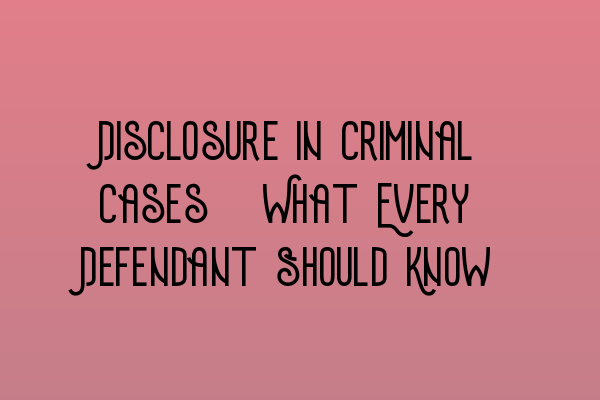Disclosure in Criminal Cases: What Every Defendant Should Know
Welcome to our blog at SQE Criminal Law & Practice Law UK. In today’s post, we will be discussing one of the most crucial aspects of criminal cases – disclosure. If you are facing criminal charges or have been accused of a crime, understanding disclosure is essential for your defense.
What is Disclosure?
Disclosure refers to the process by which the prosecution shares evidence with the defense in a criminal case. This evidence can include witness statements, police reports, forensic evidence, expert opinions, and any other relevant information that could affect the outcome of the trial.
It is crucial for defendants to receive full and proper disclosure to ensure a fair trial. As a defendant, you have the right to know the evidence against you and to have access to all material that could help your defense.
The Importance of Disclosure
Disclosure plays a significant role in the criminal justice system. It ensures transparency, allows for the proper preparation of the defense, and helps to prevent wrongful convictions. Without adequate disclosure, the defendant’s right to a fair trial may be compromised.
By understanding the disclosure process, defendants can identify any missing or incomplete evidence that may be critical to their case. This knowledge empowers defendants and their legal representatives to challenge the prosecution’s case effectively.
What Every Defendant Should Know
1. Always consult with an experienced criminal defense lawyer: A qualified lawyer will guide you through the disclosure process, ensuring that your rights are protected and that you receive all relevant evidence.
2. Be proactive in gathering information: While the prosecution has a duty to disclose evidence, it’s important to actively participate in your defense. Work closely with your lawyer to identify key witnesses, gather any relevant evidence, and provide it to the prosecution.
3. Understand the disclosure timetable: Different jurisdictions have different rules regarding disclosure. Familiarize yourself with the disclosure timetable in your jurisdiction, including key deadlines for both the prosecution and defense.
4. Familiarize yourself with the evidence: Review all evidence disclosed by the prosecution with your legal representative. Make sure you understand the implications of each piece of evidence and how it may affect your defense strategy.
5. Request additional disclosure if necessary: If you believe that some evidence is missing or incomplete, you can request additional disclosure from the prosecution. Your lawyer can assist you in making this request and pursuing any necessary legal avenues to obtain the evidence.
6. Follow proper disclosure procedures: If you intend to introduce any evidence of your own, make sure to comply with the disclosure requirements. Failing to follow proper procedures can result in your evidence being excluded from the trial.
7. Stay informed about updates: Throughout the trial process, stay in touch with your lawyer to receive updates on any new evidence disclosed by the prosecution. This will help you stay abreast of developments and make informed decisions regarding your defense strategy.
Conclusion
Disclosure is a fundamental aspect of criminal cases, and every defendant should understand its importance. By being proactive, consulting with a legal professional, and staying informed about the disclosure process, you can ensure that your defense is robust and that your rights are protected.
If you are preparing for the SQE exams, we also recommend checking out our related articles:
- SQE 1 Practice Exam Questions
- SQE 1 Practice Mocks FLK1 FLK2
- SQE 2 Preparation Courses
- SQE 1 Preparation Courses
- SRA SQE Exam Dates
If you have any questions or need further assistance, please don’t hesitate to contact us. Our team of experts at SQE Criminal Law & Practice Law UK is here to help you.
